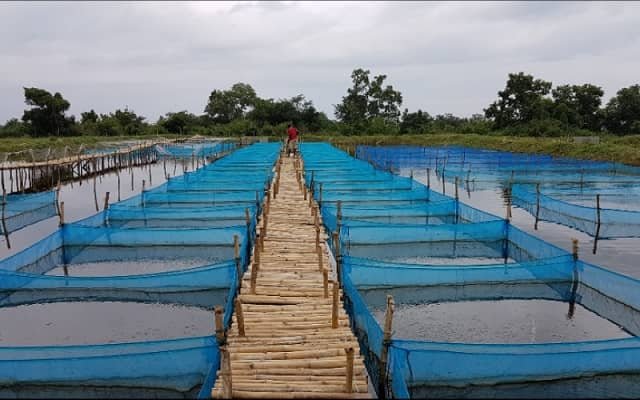
Tilapia, a popular fish known for its high protein content and mild flavor, is the second most cultivated fish species globally. But how can we ensure its quality and sustainability throughout the aquaculture process? Especially during the marketing stage when freezing and thawing processes occur.
A new study conducted by scientists from Jiangsu University, Freshwater Fisheries Research Centre of Chinese Academy of Fishery Sciences, and Guangxi Institute of Aquatic Sciences, Guangxi Key Laboratory of Aquatic Genetic Breeding and Healthy Farming, explores the impact of different aquaculture systems (Recirculating Aquaculture Systems (RAS) and traditional ponds (TAP)) on the stability of tilapia muscle protein during freezing and thawing cycles.
- 1 The challenge of freezing and thawing
- 2 RAS vs. TAP: compared aquaculture environments
- 3 Fatty acids vs. antioxidants: a tale of two environments
- 4 RAS Tilapia: More compatible with freezing and thawing?
- 5 Oxidative stability: not a significant difference
- 6 Conclusion: Quality control of frozen tilapia
- 7 Entradas relacionadas:
The challenge of freezing and thawing
While freezing is a common method for fish preservation, it can have disadvantages:
- Protein denaturation: Freezing can alter the structure of proteins, affecting texture and nutritional value.
- Oxidation: Freezing can trigger chemical reactions that degrade fats and proteins, affecting taste, color, and moisture retention.
RAS vs. TAP: compared aquaculture environments
Research suggests that the aquaculture system used can influence the quality of tilapia after freezing and thawing. In this regard, the study compared tilapia raised in two different aquaculture systems:
- Recirculating Aquaculture Systems (RAS): These controlled indoor systems reuse water, offering greater control over water quality and environmental factors.
- Traditional pond aquaculture (TAP): This method uses ponds, exposing fish to natural temperature and sunlight variations.
Fatty acids vs. antioxidants: a tale of two environments
The research revealed differences in tilapia muscle protein composition depending on the aquaculture environment:
- Tilapia raised in RAS: These fish had high levels of antioxidants such as glutathione, which can protect proteins from damage.
- Tilapia raised in TAP: Higher levels of fatty acids such as palmitic acid, which may be susceptible to oxidation during freezing.
RAS Tilapia: More compatible with freezing and thawing?
The study suggests that tilapia raised in recirculating aquaculture systems may have more stable muscle protein during freezing and thawing cycles. This is why:
- Less hemoprotein loss: RAS tilapia showed a smaller decrease in hemoprotein content (the pigment responsible for the red color in fish) compared to TAP tilapia after freezing and thawing.
- Lower surface hydrophobicity: Proteins in tilapia raised in recirculating aquaculture systems showed a smaller increase in surface hydrophobicity, a measure of protein unfolding and potential aggregation during freezing.
Oxidative stability: not a significant difference
Interestingly, the study did not find a significant difference in the oxidative stability of myofibrillar protein (the main muscle protein) between RAS and TAP tilapia after freezing and thawing.
Conclusion: Quality control of frozen tilapia
This research provides valuable insights for the quality control of frozen tilapia. Knowing the farming system can help identify fish that are likely to maintain better muscle protein stability after freezing and thawing.
While tilapia raised in recirculating aquaculture systems may show some advantages in muscle protein stability during freezing, both RAS and TAP aquaculture systems have their own sustainability considerations. Further research can help us understand these factors to ensure sustainably produced, high-quality tilapia for consumers.
Stay Always Informed
Join our communities to instantly receive the most important news, reports, and analysis from the aquaculture industry.
The study was funded by the China Agriculture Research System of MOF and MARA.
Contact
Yulong Bao
School of Food and Biological Engineering, Jiangsu University
301 Xuefu Road, Zhenjiang, Jiangsu Province 212013, China.
Email: yulong@ujs.edu.cn
Li Yuan
School of Food and Biological Engineering, Jiangsu University
301 Xuefu Road, Zhenjiang, Jiangsu Province 212013, China.
Email: yuanli24@163.com
Reference
Gao, R., Liu, L., Monto, A. R., Su, K., Zhang, H., Shi, T., Xiong, Z., Xu, G., Luo, Y., Bao, Y., & Yuan, L. (2024). Metabolomic profile of muscles from tilapia cultured in recirculating aquaculture systems and traditional aquaculture in ponds and protein stability during freeze-thaw cycles. Food Chemistry, 451, 139325. https://doi.org/10.1016/j.foodchem.2024.139325
Editor at the digital magazine AquaHoy. He holds a degree in Aquaculture Biology from the National University of Santa (UNS) and a Master’s degree in Science and Innovation Management from the Polytechnic University of Valencia, with postgraduate diplomas in Business Innovation and Innovation Management. He possesses extensive experience in the aquaculture and fisheries sector, having led the Fisheries Innovation Unit of the National Program for Innovation in Fisheries and Aquaculture (PNIPA). He has served as a senior consultant in technology watch, an innovation project formulator and advisor, and a lecturer at UNS. He is a member of the Peruvian College of Biologists and was recognized by the World Aquaculture Society (WAS) in 2016 for his contribution to aquaculture.




